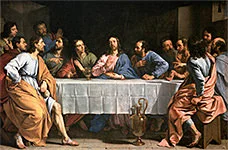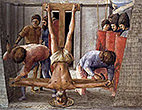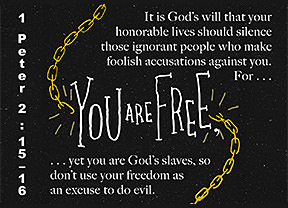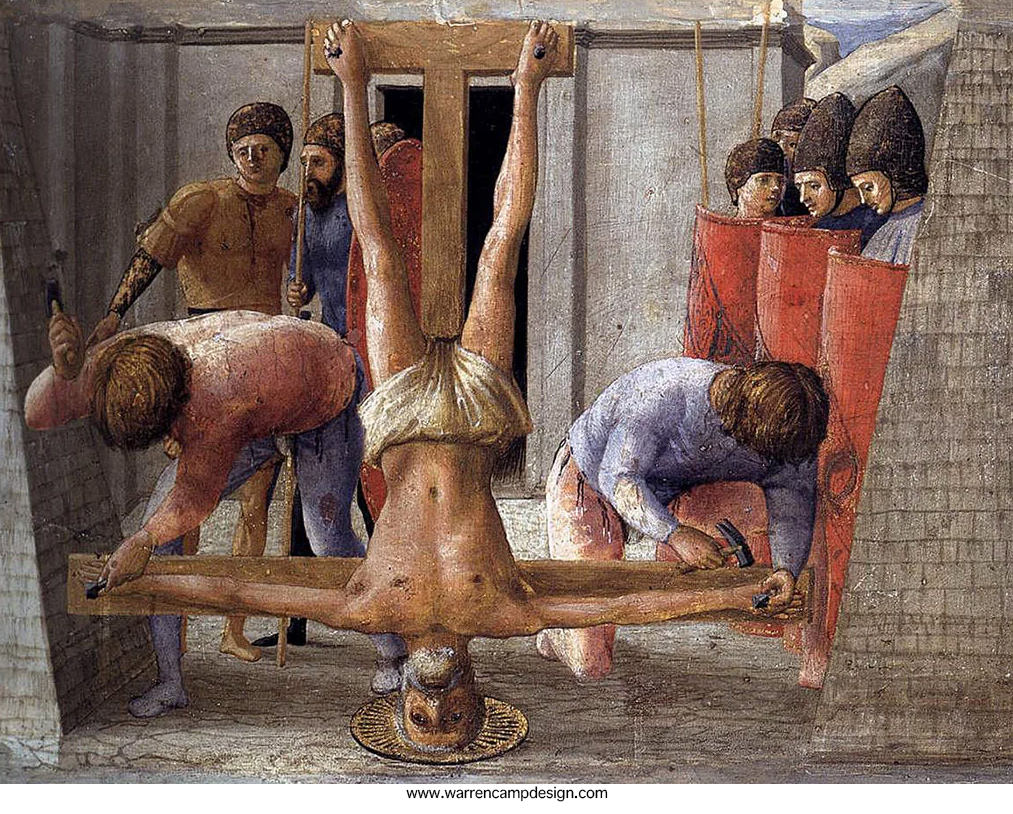
by Warren Camp
1 Peter 2:11–17 . . .
“Living Godly Lives in a Pagan Society”
Following up on what Peter highlighted in chpt. 2’s first ten verses, as shown in Warren’s previous commentary on 2:1–10), Peter will now tell us how we can expect some people to respond to our acts of godly living. While we’re obligated to live exemplary lives and dwell among ungodly people, we shouldn’t expect to be praised for it. No way! We shouldn’t even expect to receive praise anytime in this life. Holiness is a matter of obedience and hope. Peter will explain why godly living should be our goal, despite the fact that we have to pay a price for it today.
As v. 11 begins, Peter calls his readers “friends.” He also calls them foreigners, sojourners, aliens, strangers, or exiles (depending on the Bible translation). He means for them to stop thinking of themselves as locals, but as people who aren’t from around there. The transformation that God has made in them and us Christians, through Christ, is so extensive, so complete, that what we envision as our home town has changed significantly. What used to be normal for us is now foreign. We no longer fit naturally into this world’s thinking and practices. And we must not try to fit into or conform to it.
But, “Peter admits, this can be difficult. Our body wants to sin in the way that comes so naturally to humans, to those who are at home locally. Peter has made it clear that we’ve been saved from the penalty for our sin through Christ. And we’ve been freed from the authority of sin. In the power of God’s Holy Spirit, we now have the ability to choose not to sin. As saved, holy people in Christ, we ought to ‘just say no’ to the desire to sin.”[1]
Aliens and Strangers Must Be Devoted to God (2:11–12)
See how endearingly Peter connects with his readers. Before “urging” them, he addresses them most caringly: “Dear friends,” “Beloved,” “Dearly beloved,” “Dear brothers,” “My beloved ones,” “Most dear,” (depending on Bible version). This term of endearment carries with it a certain feeling of concern and pity, for no one knew any better than Peter of the fury of the gathering storm that was soon to break over the defenseless heads of the Christians.
11Dear friends, I urge you, as foreigners and exiles, to abstain from sinful desires, which wage war against your soul. 12Live such good lives among the pagans that, though they accuse you of doing wrong, they may see your good deeds and glorify God on the day he visits us (1 Pet. 2:11–12 NIV).
Peter tells us we should expect some to react to godly living. He “urges” his readers to act on the basis of gratitude, not on the basis of God’s authority. When he speaks of “foreigners and exiles,” he uses the Greek word paroikos, a word that describes individuals who live among citizens of a nation but aren’t citizens themselves. That means here that Christians aren’t citizens of this world since their citizenship is in heaven. Therefore, here they’re mere sojourning Christians who have no permanent home on earth. They and us will eventually pass on and arrive at our eternal home in the heavens.
His exhortation “to abstain from sinful desires, which wage war against your soul” refers to the desires and passions that prompt carnal appetites — the lust of the flesh. The metaphor of warfare is an apt one for the Christian life. In it is a constant struggle against many enemies, both within and without. A sojourner or pilgrim must not give himself up to the indulgence of sensual appetites or the soul’s soft pleasures. Doing so would hinder his progress while also hampering God’s great design for him to live a good life (v. 12). The winning of acceptance in a hostile environment is here held forth as the motivation for righteous behavior in the midst of an alien, pagan, non-Jewish Gentile population.
In these two verses Peter emphasizes the relationship between a Christian’s holiness, obedience, and hope. Our conduct must not be governed by mankind’s response, whether good or bad, but by the certain hope that our good/great/excellent behavior will result in pagans responsively finding themselves prone to praise and glorify God when they see Jesus. Our hope is not only for their heavenly rewards, but for those who’ve rejected God and persecuted his servants to honor and praise God.
Proper Submission to Authority (vv. 13–17)
As Christians we should be good citizens, submitting to government. This was very different from those zealous Jews in Peter’s day who recognized no king except God and paid taxes to no one but God. Peter wrote this in the days of the Roman Empire, which wasn’t a democracy or a friend to Christians. Yet, Peter still recognized the legitimate authority of the Roman government.[2]
13Submit yourselves for the Lord’s sake to every human authority: whether to the emperor, as the supreme authority, 14or to governors, who are sent by him to punish those who do wrong and to commend those who do right. 15For it is God’s will that by doing good you should silence the ignorant talk of foolish people. 16Live as free people, but do not use your freedom as a cover-up for evil; live as God’s slaves. 17Show proper respect to everyone, love the family of believers, fear God, honor the emperor (1 Pet. 2:13–17).
Christians are to submit to every human institution; in this context, Peter is speaking about civil government. Christians aren’t only heavenly citizens, they’re also earthly citizens. As such, they can and should be better citizens of the state than unbelievers. Actually, Christians show their fidelity to Christ by being loyal to the state. Whatever type of government a Christian finds himself under, be it dictatorship, republic, or democracy, he’s to submit to it. Peter’s “Submit yourselves” statement has profound significance when we realize that he was writing to Christians living under one of the most imperial monsters and tyrannical dictators of all time — Nero, Rome’s Emperor. This statement is even more potent when we realize that Peter was executed by the state under Nero’s bloody reign.
Regarding vv. 13–14, theologian Adam Clarke (1762–1832) states: “The meaning of St. Peter appears to be this: the Jews thought it unlawful to obey any ruler that was not of their own stock; the apostle tells them that they should obey their civil magistrate, let him be of what stock he may, whether Jew or Gentile, and let him exercise the government in whatsoever form.” A Christian’s duty is to submit to God’s will. Consequently, they’re to silence the slanders of ignorant, foolish men. Christians must act as God’s slaves, endeavoring to behave rightly and never use their freedom to cloak or cover wickedness. As servants of God, we must remain respectful, loving, and honoring of everyone, including those in authority.
Let’s look closely at v. 15’s “by doing good you should silence the ignorant talk of foolish people.” Usually men and women in government are ignorant of or silent about the beliefs and practices of Christians. For that reason, Christians ought to live such good lives that government officials will take notice and stop their unfounded slandering of Christians. Good works will put the Christian on the best side of government. The Christian should become a good citizen of the state so as to address all false charges.
How well are you complying with Peter’s next command to “Live as free people” (v. 16)? How could those persecuted Christians become “free people”? Many were slaves; all were under the political yoke of the tyrant Nero. Although they weren’t free externally, they were free internally, for they’d been set free from the dominance and power of sin and Satan. In God’s eyes, they were free men because they were part of the great spiritual nation chosen by God, that is, the Church (2:9). These oppressed Christians were free people who had to subject themselves only to God.
Peter followed by ordering his readers to “not use your freedom as a cover-up for evil.” Christians then and today have spiritual freedom; we are free men and women in God’s sight. But we don’t always use or demand political and social freedoms, because we have a higher end in view. Surely, as v. 16b says, we’re never to use our freedoms to further evil or to camouflage it.
Verse 16c’s “live as God’s slaves” advises us Christians that, although we’re free, we’re also slaves of God. We must never become slaves to sin but always “live as God”s slaves”! We Christians must remember that we’re free-slaves who’ve become slaves to Christ who set us free so we can devotedly serve God.
And v. 17’s “Show proper respect to everyone” literally tells us, Keep honoring all men as a fact of life, whether those being honored deserve it or not. We must value and respect all people because they’re Father God’s creatures, made in his image. We don’t have to agree with everyone, but we must respect every persons rank, office, and ideas; all people are to be honored. If we must disagree with some, let it be done respectfully.
Further, we’re to “love the family of believers, fear God, honor the emperor.” While all people should be treated with respect, we Christians should show a distinctive affection and care for those who are one with us in Christ. We’re to love all Christians continually as a testimony to the world. We’re also to have a reverential awe toward God. Finally, we see in v. 17’s “honor the emperor,” Peter returning to his original thoughts on government. Perhaps this is the punchline for the point he wants to drive home: Those who love the brotherhood while fearing God also honor the king or ruler, or emperor.
Peter’s “dear friends” were to respect Emperor Nero who was the most monstrous ruler the world has ever known. He possibly was responsible for more murders than any other man in history, including Hitler. Being a cruel, vicious tyrant, Nero was amoral and insane. Yet, Peter told these Christians to “honor the emperor.” They had every right to be filled with bitterness, resentment, and hostility toward the Roman government, and Nero in particular, because they were being persecuted. But God said they were to honor the king.
Concluding Considerations
For centuries, the Christian’s relationship to civil government has been a matter of critical importance. In the Old Testament, the nation of Israel spent 400 years under Egyptian rule. In the New Testament, the Jews were again subject to foreign rule though they refused to acknowledge their sin or their subjection. This rebellious attitude posed a danger for the Jews of Jerusalem and a danger for New Testament churches such as those to whom Peter had written. As he indicated in 2:10–12, Christianity is the fulfillment of God’s Old Testament promises.
During Peter’s days, the problem was that Rome had become increasingly displeased with Jews and Judaism, and the Jews were persistently resisting Roman control. Many of the same dangers present at the time of Peter’s writing exist today in a slightly different form. Increasingly, Christians are looked upon with suspicion as those opposed to civil authority. This is partly due to some Christians who’ve become increasingly militant and apparently more willing to break the laws of our land. We’re “foreigners, exiles, aliens, and strangers” on this earth although our true citizenship is in heaven. Nevertheless, this doesn’t mean that we’re somehow less obligated to obey our land’s laws.
Peter’s inspired instructions aim at a few key concepts: First, he documents throughout this passage our Christian duty to obey those who have authority over us. Next, he compels us to be willing to suffer while serving God faithfully. And he makes it clear that we believers in Christ have the same obligation to obey our government that unbelievers living in this nation do, however, the Christian has an even higher obligation than unbelievers. These concepts are deliberately connected in his teaching. He explains that godly people will suffer, even at the hands of those having authority over them, however, they shouldn’t use the suffering as an excuse to disobey God or rebel against people in authority. Rather, they should remain faithful to God by being respectful to the authorities despite the suffering. A proper example of upright living, combined with respectful submission towards those in authority, would set a good example to the enemies. It would help demonstrate that the persecution was unwarranted and the Christians were never a liability in the community.
- Q. 1 According to vv. 11–12, how is our new status with God to influence the way we live?
- Q. 2 What works best for you at effectively dealing with fleshly lusts? What doesn’t?
- Q. 3 What does Peter mean by “Submit yourselves” (v. 13)? What’s an example?
- Q. 4 When it comes to submitting to authority, where do you “draw the line”?

‘The Last Supper’
Click to open “Peter Masterpieces.”
Summary Video: “First Peter”
† Watch this overview video of First Peter created by BibleProject.
Warren’s New “Peter Masterpieces” Photo Album
† View several classic paintings of Saint Peter by art world masters: Rembrandt, Michelangelo, Da Vinci, Rubens, Goya, El Greco, Raphael, Masaccio, Giotto, Correggio, Tintoretto, Caravaggio, Veneziano, Tissot, Duccio, and many more.
1 Peter 2:11–17
New International Version (NIV) or view it in a different version by clicking here.
— Listen to chapter 2, narrated by Max McLean.



